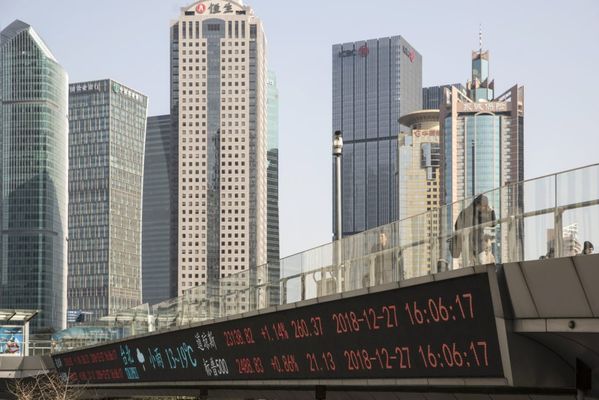Chinas New Tech Board To Usher In Market-oriented IPOs, Easier Trading Rules

Trading on China’s Nasdaq-style tech board, the STAR Market, will start on July 22, and investors are bracing for a wild rise.
Twenty-five companies – ranging from chip-makers to biotech firms – will debut on the board, launched by the Shanghai Stock Exchange.
The STAR Market is seen by some as China’s boldest capital market reform yet. China is piloting a U.S.-style system for initial public offerings (IPO) that has done away with opaque government controls over IPO timing and quantity that at times aggravated market volatility.
It also allows new companies which are still posting losses to publicly list in China for the first time.
Trading rules also have been loosened for the new board to give market forces a bigger role in setting share prices.
Below are key features of the new market.
IPO RULES
– The STAR Market will host companies with “hard technologies” in six strategic industries: next-generation information technology (IT), high-end equipment, new materials, new energy, energy conservation & environmental protection and biotech. These sectors are largely in line with those promoted by Beijing’s “Made in China 2025” blueprint.
– Consecutive years of net profit is no longer a pre-condition for IPOs. Instead, candidates are allowed to choose one of the five criteria centered around expected market capitalization. The rules allow loss-making companies to apply for IPOs, removing a hurdle that previously prevented start-up tech firms from listing domestically.
– The board allows listings by “red-chip” firms – offshore-registered Chinese companies with operations mostly onshore – as well as companies with weighted voting rights, potentially competing with overseas bourses such as Hong Kong and New York.
– Under the registration-based IPO system, the China Securities Regulatory Commission (CSRC), the stock market watchdog, will no longer vet IPOs. Instead, the Shanghai Stock Exchange will be responsible for making sure company disclosures are adequate and truthful.
– IPO prices are determined by companies and underwriters after gauging investor demand during the book-building process. The rules essentially allow price-setting by market forces, scrapping the unofficial, but always observed cap of 23 times earnings multiples.
– Companies can sell IPO shares to strategic investors – the equivalent of cornerstone investors.
– Underwriters – through their investment units – are obliged to buy 2-5% of the IPOs they sponsor. The investment is subject to a lock-up period of two years. The rules are aimed at discouraging underwriters from setting IPO prices too high as they need to put some of their money at stake.
– A greenshoe option grants an underwriter the right to sell investors up to 15% more shares than initially planned by the issuer if demand for the share offer is higher than expected.
– While regulators have done away with control over IPO timing and quantity, they have strengthened delisting rules. Listed companies found to be in serious violation can be delisted immediately. Delisting is rare elsewhere in China’s stock markets.
TRADING RULES
– Retail investors must have 500,000 yuan ($72,674) worth of financial assets in their trading accounts, as well as two years’ trading experience, to trade on the STAR Market.
– There will be no daily price limits for the first five days of trading in new stocks, compared with the existing 44 percent limit on other boards. After that, stocks listed on STAR will be allowed to rise or fall by up to 20% each day, twice as much as the limit on other mainland exchange-run boards.
– There are circuit breakers aimed at briefly halting trade in the event of sharp and sudden price fluctuations.
Reuters
Indian Food Delivery Unicorn Zomato Likely To File For IPO Next Month
Food delivery unicorn Zomato is planning to file for an Initial Public Offering (IPO) by April which could raise $65... Read more
Vietnams Bamboo Airways Aims Third-quarter Listing With Market Cap Of $2.73b
Vietnam’s startup Bamboo Airways said on Friday it aimed to list its shares on a local stock exchange in the thi... Read more
Didi Chuxing Advances IPO Plans To Next Quarter, Targets $62b Valuation
Chinese ride-hailing giant Didi Chuxing Technology Co. is accelerating plans for an initial public offering to as early... Read more
Warburg-backed Kalyan Jewellers IPO Loses Shine, Sees Tepid Demand
Kalyan Jewellers India Ltd’s initial public offering was oversubscribed by just 1.28 times on Thursday, a sign of tep... Read more
Chinese E-commerce Platform DMall Hires Banks For Over $500m US IPO
Chinese e-commerce platform Dmall (Beijing) E-commerce Co has hired Bank of America, Goldman Sachs and JPMorgan for a... Read more
Tencent-backed Chinese Software Firm Tuya Eyes $915m In US IPO
Tuya Inc., a software company backed by New Enterprise Associates and Tencent Holdings Ltd., is on track to raise $915 ... Read more

